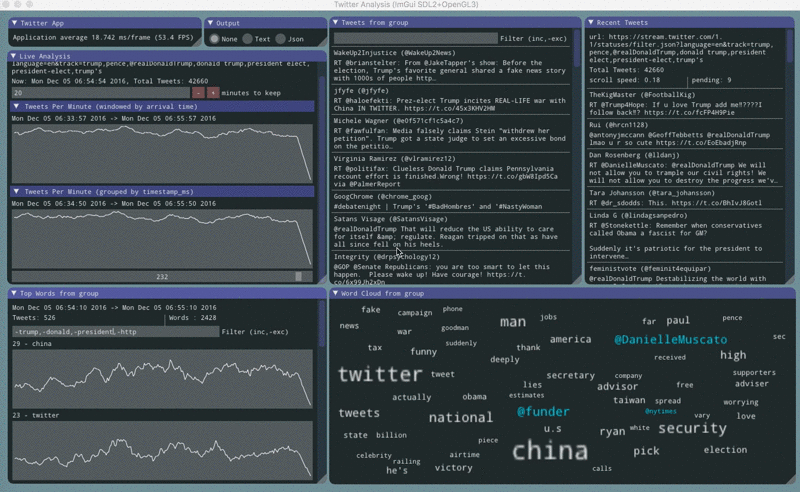Composing rxcpp and Range-v3
values-distributed-in-time
rxcpp is a set of algorithms that operate on values separated by time. The twitter application is emitting updated Models every 200ms. rxcpp algorithms are a good fit for orchestrating the flow of Models into ViewModels that are then delivered to the rxcpp expression that will render.
Use rxcpp to convert Models to ViewModels
auto viewModels = models |
// if the processing of the model takes too long, skip until caught up
filter([=](const shared_ptr<Model>& m){
return m->timestamp <= mainthread.now();
}) |
rxo::map([](shared_ptr<Model>& m){
return ViewModel{m};
}) |
publish() |
ref_count();
values-distributed-in-space
Range-v3 is a set of algorithms that operate on values separated by space. The ViewModel constructor receives an instance of the Model which is a space that contains only values that have already arrived. While the values in space could be processed by rxcpp, Range-v3 is a much better fit.
Construct ViewModel state from a Model using Range-v3 algorithms
struct ViewModel
{
ViewModel(shared_ptr<Model>& m) : m(m) {
if (idx >= 0 && idx < int(m->groups.size())) {
auto& window = m->groups.at(idx);
auto& group = m->groupedtweets.at(window);
words = group->words |
ranges::view::transform([&](const pair<string, int>& word){
return WordCount{word.first, word.second, {}};
});
words |=
ranges::action::sort([](const WordCount& l, const WordCount& r){
return l.count > r.count;
});
}
using group_type=pair<milliseconds, float>;
vector<group_type> groups = m->groupedtweets |
ranges::view::transform([&](const pair<TimeRange, shared_ptr<TweetGroup>>& group){
return make_pair(group.first.begin, static_cast<float>(group.second->tweets.size()));
});
groups |=
ranges::action::sort([](const group_type& l, const group_type& r){
return l.first < r.first;
});
groupedtpm = groups |
ranges::view::transform([&](const group_type& group){
return group.second;
});
}
shared_ptr<Model> m;
vector<WordCount> words;
vector<float> groupedtpm;
};
The result, is that rxcpp orchestrates the calculation of a new ViewModel every 200ms and the calculation is done using Range-v3!
